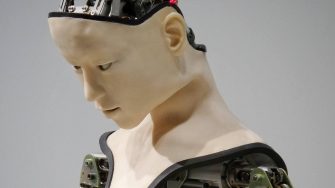
Exploring the human-machine relationship
From driverless cars to robotic caregivers for the elderly, we live in a world where ‘smart’ systems are increasingly part of our everyday lives. Autonomous systems operate in complex and open-ended environments, using artificial intelligence (AI) to respond to feedback and unforeseen changes in the environment. These intelligent systems shift the workload from humans and let us take advantage of information technology and its ability to deliver significant benefits. There is huge potential for these systems to positively impact our society and increase our quality of life in industries like health, education and defence.
As the application of autonomous systems becomes more widespread the emphasis on a cooperative relationship between humans and machines becomes more significant. Safety, accuracy and security are always major concerns related to the adoption of autonomous systems. For people to feel comfortable using these systems they need to be trustworthy. But what does trustworthiness mean when it comes to artificial intelligence? And how can it be designed to develop trusted autonomous systems?
Associated schools, institutes & centres
Impact
Trusted autonomy is an emerging field of research focused on understanding and designing the interaction space between entities, each of which exhibits a level of autonomy. These entities can be humans, computer-controlled machines or a mix of the two. Our aim is to integrate humans and machines seamlessly, naturally and efficiently to create a trusted and cooperative team to solve complex problems in an uncontrolled, uncertainty-rich environment.
We have expertise in traditional machine learning, the navigation and control of autonomous vehicles, developmental robotics, computational motivation and computational red teaming. We are unique in Australia because of this mix of expertise. We have the ability to innovate concepts, taking them from ideation through to real-world applications that raise productivity, improve resources and enhance human safety.
We've developed:
- more effective solutions to technological challenges including the deployment of autonomous vehicles, activities at the human-machine interface, high-fidelity military simulations and multi-robot operations in unknown and complex environments
- more agile and accurate decision-making cycles
- an accurate understanding of public acceptance and adoption rate of automation in everyday life.
Competitive advantage
- Unique combination of skills covering advanced topics such as robotics, AI, simulation and ethics.
- Long-standing and deep ties with Defence.
- Outstanding facilities for simulation and robotics.
- Focus on trusted human-autonomy teaming.
Successful applications
- Swarm-based machine learning with knowledge sharing.
- Demonstration of learning-to-fly from scratch on real unmanned aerial vehicles (UAVs) using neural networks and evolutionary fuzzy systems.
- Demonstration of visual flight control of UAVs for flight in cluttered areas and landing on moving platforms.
- Development of human performance surrogates for high-fidelity military simulations.
- Hierarchical deep learning algorithms for robot control.
-
- Rojas, Raul Fernandez, Essam Debie, Justin Fidock, Michael Barlow, Kathryn Kasmarik, Sreenatha Anavatti, Matthew Garratt, and Hussein Abbass. "Electroencephalographic Workload Indicators During Teleoperation of an Unmanned Aerial Vehicle Shepherding a Swarm of Unmanned Ground Vehicles in Contested Environments." Frontiers in Neuroscience 14 (2020).
- Khan, Md Mohiuddin, Kathryn Kasmarik, and Michael Barlow. "Autonomous Detection of Collective Behaviours in Swarms." Swarm and Evolutionary Computation (2020)
- Debie, Essam, Raul Fernandez Rojas, Justin Fidock, Michael Barlow, Kathryn Kasmarik, Sreenatha Anavatti, Matthew Garratt, and Hussein A. Abbass. "Multimodal fusion for objective assessment of cognitive workload: a review." IEEE Transactions on Cybernetics (2019)
- Tian, Runyu, Liang Li, Wei Wang, Xinghua Chang, Sridhar Ravi, and Guangming Xie. "CFD based parameter tuning for motion control of robotic fish." Bioinspiration & Biomimetics 15, no. 2 (2020)
- Abdelfattah, Sherif, Kathryn Kasmarik, and Jiankun Hu. "A robust policy bootstrapping algorithm for multi-objective reinforcement learning in non-stationary environments." Adaptive Behavior (2019)
- Khan, Md Mohiuddin, Kathryn Kasmarik, and Michael Barlow. "Toward Computational Motivation for Multi-Agent Systems and Swarms." Frontiers in Robotics and AI 5 (2018)
- Young, John, and Matthew Garratt. "Drones become even more insect-like." Science 368, no. 6491 (2020)
- Santoso, Fendy, Matthew A. Garratt, and Sreenatha G. Anavatti. "T2-ETS-IE: Type-2 Evolutionary Takagi-Sugeno Fuzzy Inference Systems with Information Entropy-Based Pruning Technique." IEEE Transactions on Fuzzy Systems (2019)
- Tran, Vu Phi, Matthew Garratt, and Ian R. Petersen. "Switching time-invariant formation control of a collaborative multi-agent system using negative imaginary systems theory." Control Engineering Practice 95 (2020)
- Dhakan, Paresh, Kathryn Kasmarik, Iñaki Rañó, and Nazmul Siddique. "Open-Ended Continuous Learning of Compound Goals." IEEE Transactions on Cognitive and Developmental Systems (2019)
- Rojas, Raul Fernandez, Essam Debie, Justin Fidock, Michael Barlow, Kathryn Kasmarik, Sreenatha Anavatti, Matthew Garratt, and Hussein Abbass. "Electroencephalographic Workload Indicators During Teleoperation of an Unmanned Aerial Vehicle Shepherding a Swarm of Unmanned Ground Vehicles in Contested Environments." Frontiers in Neuroscience 14 (2020).
Research projects
- Trusted Human-Autonomy Teaming in Teleoperations
- Autonomous Learning, Reasoning and Decisions-Making in Dynamic Environments
- Behaviours Bootstrapping for Ad Hoc, Heterogeneous Robot Swarms
- Compliant Musculoskeletal Actuation in Flying Insects and Bio-inspired Designs for Miniature Robots
- Robust flight control systems for miniature lighter-than-air robots
- Autonomous Precision Access (APA): Resilient flight control for trusted, robust, real-time adaptive control using Neuro-Fuzzy approaches
- Heterogeneous Multi Robot Test Bench
- User-task co-adaptation for effective interactive simulation environments.













